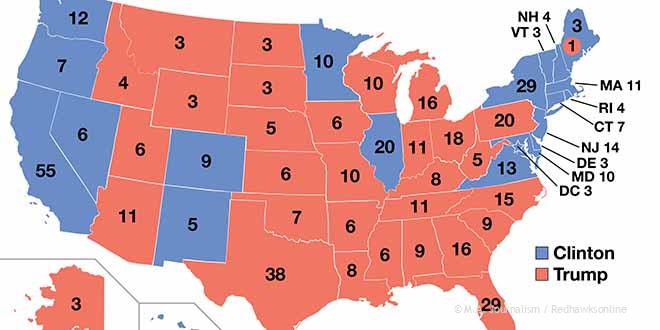It sounds so wrong: Hillary Clinton winning the popular vote by 2 million votes and losing the election. Historically, a situation like this ends with calls for the abolishment of the Electoral College due to this undemocratic result.
However, the Electoral College is an old institution that, once examined, has benefits that far outweigh the unclear consequences of a popular vote system.
Opponents of the Electoral College argue that above all the system is undemocratic, in addition to the fact that your vote may vary in importance depending on where you live. These may seem like powerful arguments, but when examined closely, they fall apart. Also, the Electoral College has major benefits that aren’t always discussed.
Is the Electoral College undemocratic? Here is how that argument plays out: We as American citizens don’t directly elect the president because the candidate that receives the most votes isn’t the automatic winner.
There is instead some much-maligned undemocratic process that gets in the way of the votes we cast. However, this argument is often unnecessary, and a popular vote system would hardly be better.
First of all, it is very rare that the electoral college goes against the popular vote. It has happened only five times in the United States’ history, with the most recent being in 2000 and unofficially in 2016.
Before 2000, the last time a candidate was elected without majority support was in 1888.
Usually, a popular vote overridden by the Electoral College is not an issue.
When it does happen, it is important to remember that since the Constitution was written, the United States have never been a direct democracy.
We are a representative democracy. In fact, the president and vice president are the only positions that a person must be elected to in the entirety of the judicial and executive branches.
If the Electoral College should be abolished, should not the next logical step be taken, and the Senate also be abolished, as it does not proportionally represent states?
Another argument against the Electoral College is that in a “safe state” (a state that reliably votes for a certain party), voting for the other party is futile, and therefore some Americans’ votes don’t count.
For example, a Republican voting in Minnesota hasn’t seen their state turn red since 1972, the second longest democratic streak behind Washington, D.C.
However, voters in this situation still come out to vote in order to show their political preference.
Even in states like Minnesota, Republicans turn out. For example, in the latest election, Californians cast twice as many votes for Hillary Clinton than Donald Trump, and yet over four million Republicans still voted.
In the most recent election, the Electoral College doesn’t seem to be suppressing voters.
It is actually a benefit that the president could win without a majority 50 percent of votes in the Electoral College, even though that is sometimes put forward as an argument against it.
A popular vote system has no clean way to deal with lack of majority, while the Electoral College comes out with a clear winner. This leads to the first major benefit of the Electoral College: clarity.
The Electoral College elects a president with certainty.
The Electoral College rarely ties, but when it does, it is far easier to deal with than a popular vote system.
If a popular vote system were put in place and a recount was called for, possibly the entire nation would have to be recounted, which would be a messy, long process producing an unclear leader. The Electoral College is clear.
In addition, the Electoral College requires candidates to have trans-regional appeal.
Candidates currently have to care about the wants and needs of groups of people who are in the minority, because minority groups of people have far more of a voice in the Electoral College, due to it’s winner-take-all nature.
If there were a popular system in place, candidate could focus on just one populous region of America and be elected, creating a situation where a candidate doesn’t care if they’ll be a “president for all Americans.”
Hillary Clinton winning the popular vote but losing the election may sound wrong, but it is the system that the United States has always had in place, and has many benefits. Switching to a popular system would have consequences that far outweigh the few benefits. The United States should keep the Electoral College.

